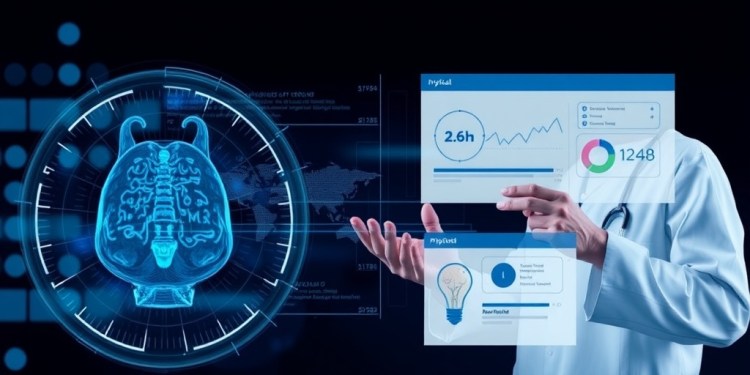
Artificial Intelligence in Healthcare: A Leap Towards Enhanced Clinical Decision-Making
In an era defined by rapid advancements in technology, the integration of artificial intelligence (AI) into healthcare has emerged as a groundbreaking innovation. A study published in the esteemed Annals of Internal Medicine sheds light on the potential benefits of AI-driven clinical recommendations in improving healthcare delivery. The findings come from a rigorous comparison of AI-guided recommendations and traditional physician decision-making within a virtual primary care environment. This research marks a significant leap forward in our understanding of how AI can augment clinical practice and ultimately improve patient outcomes.
The study highlights how AI technology, trained on an extensive dataset of clinical cases, can process vast amounts of information within seconds. This capability enables AI to identify patterns and offer treatment plans based on real-world clinical data, surpassing the limitations of individual physicians who may not have access to such comprehensive datasets throughout their careers. The researchers, affiliated with notable institutions such as Tel Aviv University and Cedars-Sinai Medical Center, focused on common acute health complaints encountered during virtual primary care visits. Here, the AI system demonstrated its prowess by providing clinical recommendations that were rated more favorably than those made by human physicians.
A hallmark of the study was its deployment of expert adjudicators tasked with evaluating the performance of both AI and human recommendations. The results were revealing. In around two-thirds of cases, physicians echoed the AI’s clinical decisions. However, in the remaining cases, the AI’s recommendations were deemed superior to those made by physicians twice as often as they were considered inadequate. This suggests that while human intuition and experience remain crucial, AI can provide an often-needed enhancement, offering a second opinion that is grounded in extensive data analysis.
Moreover, the researchers emphasized that AI not only performed better in providing recommendations but also exhibited a significantly lower risk of potential harm. With only half the number of “potentially harmful” ratings compared to human decisions, it becomes clear that AI can play a critical role in mitigating risks associated with clinical decisions. This may reshape how healthcare providers approach treatments and consultations, potentially leading to improved patient safety and better health outcomes.
As AI continues to evolve, its role in clinical decision-making will likely grow even more pronounced. By adhering strictly to contemporary medical guidelines and utilizing detailed patient data, AI systems excel at recognizing subtle patterns and nuances in patient records that might elude even seasoned physicians. This capability stands to transform the landscape of primary care, allowing for more precise and personalized treatment strategies tailored to individual patient needs.
Despite its advantages, the study also serves as a reminder about the importance of caution in adopting AI technologies. An accompanying editorial from a researcher at Tufts University School of Medicine emphasizes the need for a balanced approach. While AI can significantly enhance clinical capabilities, it should not replace the human touch that is crucial in patient interaction. Physicians possess unique skills in understanding and clarifying patient symptoms during consultations—an area where AI, for now, still falls short.
The editorial suggests that integration of AI into everyday medical practice should focus on its strengths, such as confirming diagnoses and treatment plans proposed by physicians, rather than replacing them outright. Moreover, discrepancies between AI recommendations and physician judgments should prompt further investigation, leading to potential improvements in AI tools themselves. This interaction between human expertise and AI systems could foster an environment where continuous learning and adaptation become integral to the healthcare process.
As clinicians increasingly embrace AI tools in their practice, careful considerations are paramount. The study advocates for a cautious approach wherein healthcare providers remain vigilant and informed about the strengths and limitations of AI. The ultimate goal should be to foster a synergistic relationship between AI technologies and human practitioners, paralleling the advancements in medical care with the evolving landscape of technological innovation.
The implications of such advancements are profound. As healthcare systems become more complex, the combination of AI precision and human empathy could redefine the patient experience. Enhanced decision-making abilities may lead to faster diagnoses, better treatment options, and continuous monitoring, allowing for timely interventions that can drastically improve patient health outcomes and quality of life.
Beyond the bounds of primary care, the use of AI in other medical specialties holds extensive promise. From radiology to oncology, AI applications have the potential to deliver more accurate analyses and predictive outcomes through data processing capabilities that vastly surpass human limitations. In these fields, AI could assist in detecting abnormalities in imaging studies and predicting disease progression, ultimately playing an invaluable role in early intervention strategies.
As AI continues to permeate healthcare systems, ongoing research will be essential to ensure that the integration of these technologies aligns with ethical considerations and enhances the quality of care. Continuous dialogue among researchers, clinicians, and policymakers will be crucial in navigating the challenges and opportunities posed by AI. By prioritizing patient welfare and safety, the integration of AI can be steered in ways that benefit both providers and patients alike.
In summary, this study underscores the potential of AI-driven clinical recommendations in enhancing healthcare delivery. By leveraging detailed data analysis and modeling, AI can augment physician decision-making, ultimately leading to improved patient outcomes. The combination of AI abilities and human expertise holds the key to a future where healthcare is both technologically advanced and inherently compassionate.
Subject of Research: Artificial Intelligence in Clinical Decision-Making
Article Title: Artificial Intelligence Recommendations versus Physician Decisions: Comparison in Remote Visits
News Publication Date: 4-Apr-2025
Web References: Annals of Internal Medicine
References: Not Applicable
Image Credits: Not Available
Keywords: Artificial Intelligence, Healthcare, Clinical Decision-Making, Patient Outcomes, Telemedicine, Medical Guidelines, Health Technology, Chronic Illness Management.
Tags: AI clinical recommendations studyAI in healthcareAI-driven healthcare solutionsCedars-Sinai Medical Center collaborationsclinical decision-making improvementenhancing patient outcomes with AIhealthcare delivery advancementsphysician decision support systemsreal-world clinical data analysistechnology in medical practiceTel Aviv University researchvirtual primary care innovations





